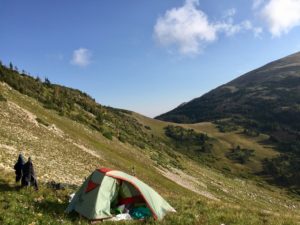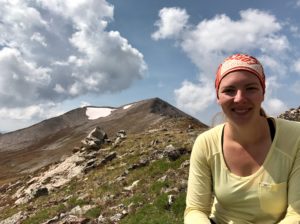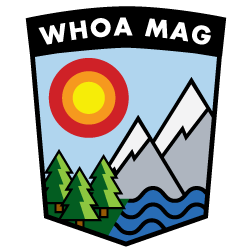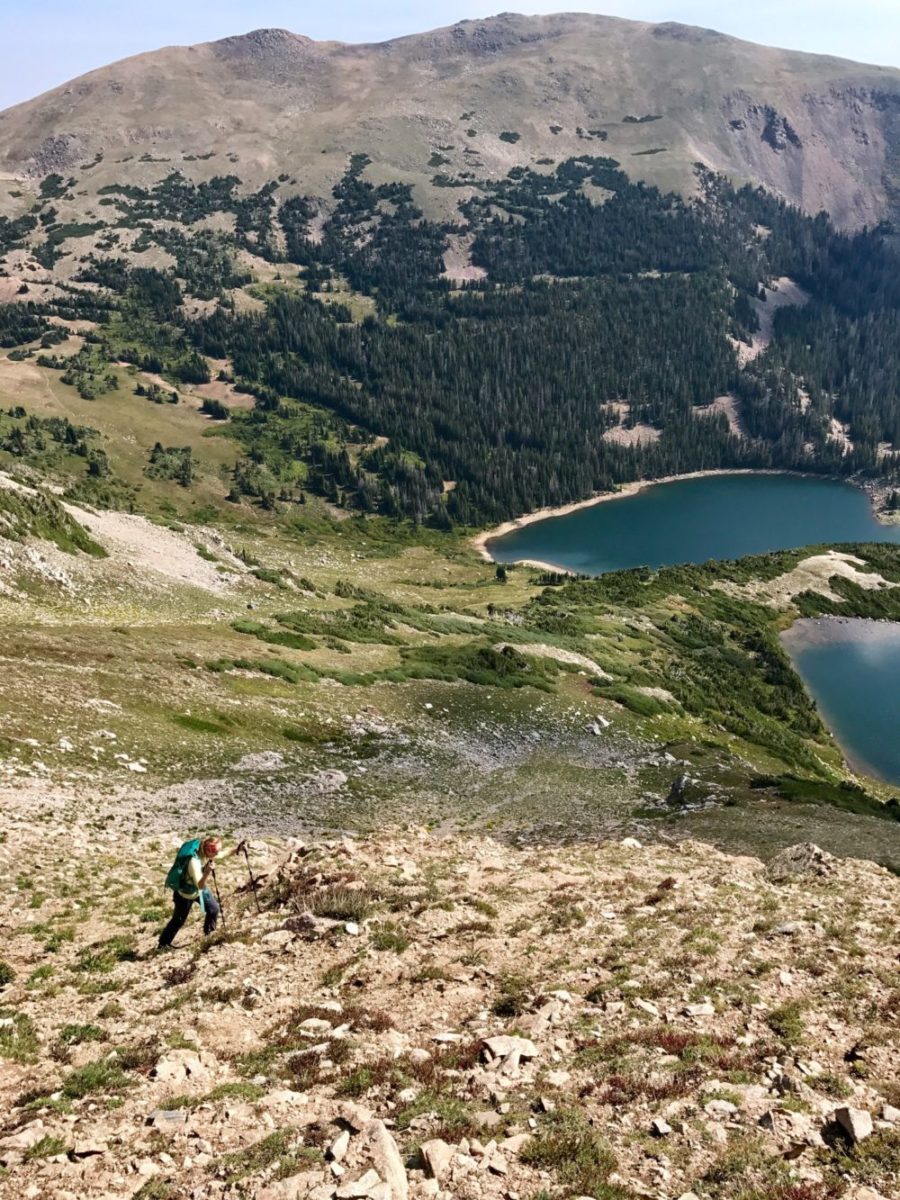Going Longer: A Love/Hate Relationship with Backpacking
From the passionate essays I have read I am led to believe that there are people who find pure, blissful enjoyment from backpacking and wilderness camping. I don’t get it. I never sleep well in the tent and I can barely stomach the dehydrated and highly processed foods made for packing. I’ve always been skeptical of the impacts of going out to do all the human things that leave lasting footprints in our ever-shrinking wild places. Despite these misgiving, I can’t fight the love I’ve always had for hiking and exploring nature, and the more I get out there, the more I find myself seeking ways to do more, go longer.
Still, when my boyfriend and I made plans to go to Colorado for a long weekend, a place I once called home, I surprised myself by planning a backpacking trip for us. Though my family loved hiking and spending time in nature’s most beautiful places across the American West, we never camped. I’d truly only gone backpacking once before the Colorado trip when I was invited along on a 4-day loop out of Mineral King in the Sierras. I did not enjoy that trip, which was probably a bit too much to take on for my first time. The effects of high elevation, poor nutrition, and lack of sleep prevented me from taking in the grandeur of my surroundings, and I didn’t think I’d ever be convinced to try again.
I helped my best friend train for a thru-hike of the John Muir Trail, doing day hikes with weighted packs, but I always returned home for dinner and my bed. Then my boyfriend took me on a canoe trip, and we were able to pack in a cooler with fresh foods and boxed wine, and I gave wilderness camping another chance. I slept more soundly when I shared the tent with him, felt safer, and fell back asleep more quickly, even though almost every gust of wind still woke me. I took trips to Idaho, Montana, and Alaska with him, where I learned to hike steeper, more technical terrain, where trails didn’t always exist.
My love of hiking continued to grow as I carried myself up and down mountains, taking in the beauty of the world around me.
When the opportunity for the trip to Colorado came up, I knew we would try to spend most of our time in the mountains, and since I’d once been a local, the planning would fall to me. I decided to take him up to Cameron Pass, up the Poudre Canyon in Northern Colorado, west of where I’d attended school at Colorado State University in Fort Collins. Though I’d been up the canyon many times whitewater rafting and hiking, Cameron Pass was an area I hadn’t explored much on my own. I knew just enough to want to see and learn more.
Contrary to what we’d read in the weather reports, it started raining when we were less than a quarter mile from the trailhead. Rain shells came out of our packs, and this wasn’t one of the afternoon storms that quickly passed through the Rockies most summer afternoons. Precipitation assaulted the Gore-Tex for most of our hike into the Rawah Wilderness. The trail made a steady climb to Blue Lake, and while I wouldn’t have wanted to take the half day hike any slower as rain showers soaked through my outer layer and invited in the alpine chill, I had underestimated this route’s difficulty.

We set up camp in thunder and sleet above 11,000′ elevation on a bench that was not flat enough for our tent. The cold was making me clumsy and confused. We were well prepared with warm, packable down and I slithered into the bed I had carried up the trail with a sense of foggy, uncertain relief. I awoke many times that night to crashing thunder and gusts battering against the thin walls of our tent. Ryan and I kept waking each other up as we pulled our sleeping bags and pads up from the pile they slumped to at the foot of the tent as they continually, inevitably, found their way downhill. Each time I woke up I strained my ears against the storm for the improbable sound of a black bear investigating our camp. While we were questionably rested, by morning the storms cleared. Our gear dried and my headache from the elevation faded to a dull thud.
By 1 p.m. we had scrambled up rock fields and traversed steep ridge lines to make our way to the highest peak in the Medicine Bow Range. From start to finish, it was one of the most challenging hikes I’ve ever completed. Clark Peak isn’t particularly notable in the mountaineering world, as its ridgeline is considered a Class 3+, still firmly in the realm of hiking. It is still the high point of its range and county with its peak shy of 13,000’. Much bigger, more technical peaks rise as the Rocky Mountains travel south.

The summit may not be listed in guidebooks or featured in magazines, but I’m not a professional mountaineer, and a little known two-day hike was more thrilling to me than following a crowd up a 14-er. False peaks challenged us mentally as we climbed and I had to be reminded to stop and hydrate and refuel my body with a Clif Bar for the energy to keep going. Even though we both grew tired, and the effects of elevation kicked in again, we had to keep going so we could get up to the summit and then back down, off the exposed ridgeline in case another storm suddenly whipped up. Though we spotted a few dark clouds in the distance, the weather had punished us enough the day before, and we came off the peak slightly sunburned from the bright sunlight.
The views from the peak were spectacular, but the moment at the top was just one of many I look back on and remember vividly. The accomplishment of putting all the pieces together and getting us in and out of such an incredible landscape in some ways meant more than the summit. I had planned a backpacking trip that my more experienced boyfriend was happy to follow and we had both been challenged in ways that made us better, probably in even more ways than I can know.
A week after summiting Clark Peak, reflecting on the trip back at home, I still felt strong. I felt more in touch with my body and more driven to pursue the things that make life interesting, that make me feel alive, moving more steadily and creating more passionately. And now, I’m starting to get what it is about backpacking that makes people write and speak so enthusiastically, that makes people take time off work to spend months through hiking trails like the PCT.
It’s not about proving myself against nature, showing my self-sufficiency by carrying my needs on my back and feeling my gear stave off the cold and wet, though we did that. That wasn’t it for me. After the 5-mile hike to camp at Blue Lake, we were better prepared to summit Clark Peak. I’m not sure I would’ve made it without having that base camp to acclimate and rest before the trail-less hike to nearly 13,000′. Backpacking in enabled us to go farther for longer.
I’m still asking myself why exactly I was driven to that summit in the first place.
Maybe the peak never mattered, not to me. Maybe this hike didn’t teach me any lesson more profound than any other in my short lifetime of walking up and down mountains. But every step is adding up. Finding more ways to get myself outside in wild and beautiful places, to do bigger, bolder things makes me feel whole. I may be smacked in the face with my humanity but I come away clear-headed and inspired to make more of my time on this amazing earth. I may not enjoy carrying a pack, eating dehydrated foods, or sleeping in a tent but I’m starting to understand why it’s worth doing.
In fact, I’m already looking for opportunities to plan my next multi-day trip into the mountains.
About the Writer
Emily Sehloff is a mountain-loving creative currently making a home in Wisconsin. A landscape architect by trade, she loves to explore and examine the many facets of the landscapes she moves through and uses writing, drawing, and photography to express what she sees. You can find these themes, along with her reflections as a yoga teacher and snapshots of her other outdoor hobbies on her Instagram.”


I can totally relate to all of this! I, too, don’t LOVE carrying a heavy pack. And I, too, never REALLY sleep well when backpacking. But the beauty and simplicity of it all, and what that does for my soul and psyche, keeps me coming back again and again and again. If I think really logically about the act of backpacking, I think, “Why would ANYONE do this????” But it’s not about the logic of it. The pains and frustrations and lack of comfort become worth it for those of us who can’t get enough of just being out there and experiencing mamma in all her glorious forms. Emily – you might appreciate a story I wrote recently about my hatred for wildflowers and how it happened 🙂 https://beginningbackpacker.net/2018/04/13/why-i-hate-wildflowers-backpacking-the-gros-ventre-wilderness-aug-2017/
Hi Liz!
Thank you so much for checking out Whoa Mag! We dug Emily’s story too. We shared your wildflower piece on our Facebook – what a great story! Love the detail of “nature’s Velcro”. Happy trails! – Hatie